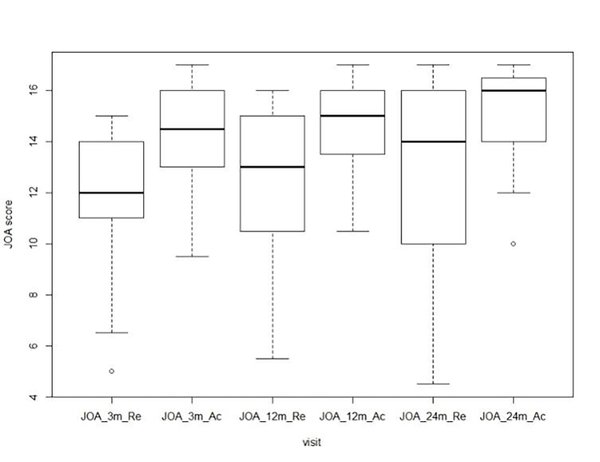-
Home
-
About JCTR
-
Gold Open Access
-
Issues
-
Editorial board
-
Author guidelines
-
Publication fees
-
Online first
-
Special issues
-
News
-
Publication ethics
-
Partners
-
Submit your manuscript
-
Submit your review report
-
Editorial Office
-

This work is licensed under a Creative Commons Attribution-NonCommercial 4.0 International License. ISSN print: 2382-6533 ISSN online: 2424-810X
Volume 8 Issue 6
Accuracy of postoperative recall by degenerative cervical myelopathy patients using the modified Japanese Orthopaedic Association scale
Shuai Chang†, Nanfang Xu†, Yubo Luo, Shaobo Wang*, Zhongjun Liu*
Chang et al. J Clin Transl Res 2022; 8(6):12
Published online: November 15, 2022
Abstract
Background and aim: The modified Japanese Orthopaedic Association (mJOA) scale is one of the primary measures of neurological function used on patients with degenerative cervical myelopathy (DCM). Contrary to some reports, the mJOA is not based on patient-reported outcomes (PROs) as it is an assessment conducted by physicians, allied health professionals, or trained staff. To date, the accuracy of postoperative recall by DCM patients of their pre-operative neurological function, as assessed by the mJOA scale, has not been examined. This study therefore aimed to evaluate recall accuracy in DCM patients using the mJOA scale.
Methods: This study analyzed recall capacity of DCM patients who had undergone anterior cervical discectomy and fusion by a single surgeon at a large academic spine center between February 2012 and August 2017. Patient recall of neurological function pre-surgery was assessed at 3, 12, and 24 months post-surgery using the mJOA scale. Actual mJOA scores were also determined at each follow-up. Recall error was defined as the difference between recalled mJOA score at each postoperative visit and the actual baseline score. Age, gender, surgical segments, hospital length of stay, actual mJOA scores at follow-up, and actual rate of improvement in mJOA score were analyzed as predictors of recall accuracy. Descriptive statistics were collected to profile the characteristics of patients enrolled in the study cohort. All statistical computing and graphing were performed with R software and GEE model fitting was done using geepack package.
Results: A total of 105 patients (56.2% male; 43.8% female) were enrolled in the study. The median ± SD (range) age at the pre-surgical baseline measurement was 50 ± 8 (25-78) years. The recalled mJOA scores at the three follow-up time points were lower than the actual mJOA scores. The recall accuracy gradually decreased over time. Estimated coefficients showed that all variables in the GEE model except for surgical fusion segments were significant (P < 0.05). The preoperative actual baseline mJOA score was inversely associated with recall error. An increasing actual mJOA score over time had a significant positive influence on recall error. Greater recall error was found in males compared to females. Unexpectedly, age was inversely associated with recall error.
Conclusions: The recall error increases with the time interval between presurgical measurement and post-surgical follow-up and is more prominent in male DCMs patients following upper spine surgery.
Relevance for patients: It is necessary to select postoperative patients who need to pay attention according to the three factors of postoperative time, gender and age, that is, patients with large recall error should be given early or timely psychological counseling and treatment concerns, so as to reduce the occurrence of potential medical disputes and improve the level of medical safety.
†These authors contributed equally to this work.

DOI: http://dx.doi.org/10.18053/jctres.08.202206.012
Author affiliation
1. Department of Orthopedics, Peking University Third Hospital, Beijing, 100191 China
2. Beijing Key Laboratory of Spinal Disease Research, Peking University Third Hospital, Beijing, 100191 China
3. Engineering Research Center of Bone and Joint Precision Medicine, Ministry of Education, Peking University Third Hospital, Beijing, 100191 China
4. School of Mathematics and Statistics, Beijing Technology and Business University, Beijing, 102488 China
*Corresponding author
Shaobo Wang
Department of Orthopedics, Peking University Third Hospital, Beijing, 100191 China
Beijing Key Laboratory of Spinal Disease Research, Peking University Third Hospital, Beijing, 100191 China
Engineering Research Center of Bone and Joint Precision Medicine, Ministry of Education, Peking University Third Hospital, Beijing, 100191 China
Email:bysywangshaobo@outlook.com
Zhongjun Liu
Department of Orthopedics, Peking University Third Hospital, Beijing, 100191 China
Beijing Key Laboratory of Spinal Disease Research, Peking University Third Hospital, Beijing, 100191 China
Engineering Research Center of Bone and Joint Precision Medicine, Ministry of Education, Peking University Third Hospital, Beijing, 100191 China
Email: zjliu@bjmu.edu.cn
Handling editor:
Michal Heger
Department of Pharmaceutics, Utrecht University, the Netherlands
Department of Pharmaceutics, Jiaxing University Medical College, Zhejiang, China

